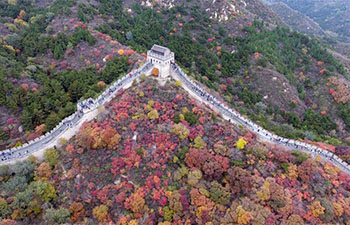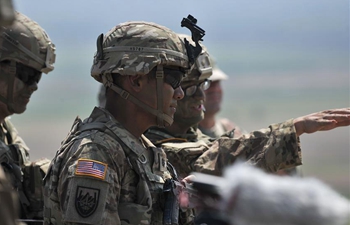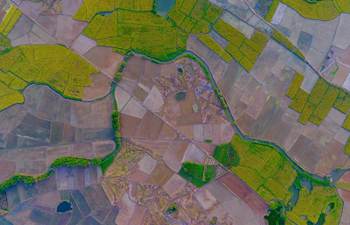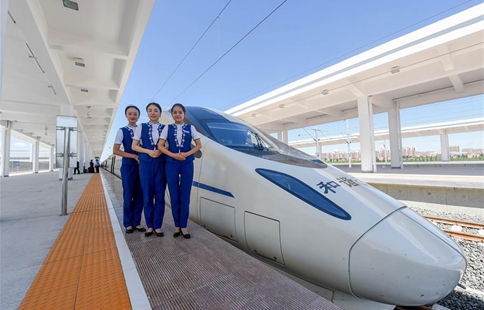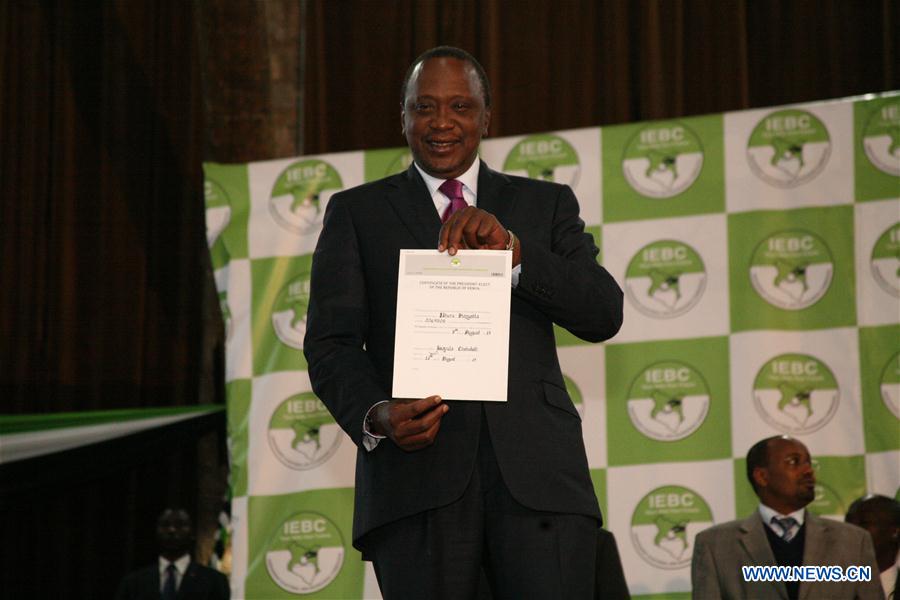
Kenyan President Uhuru Kenyatta shows the certificate as the winner of presidential elections in Nairobi, capital of Kenya, on Aug. 11, 2017. Kenyan President Uhuru Kenyatta was on Friday declared the winner of Tuesday's presidential elections with 8.20 million (54.27 percent) votes against 6.76 million (44.74 percent) for his main challenger, Raila Odinga after a tense electoral process which was preceded by an opposition walkout. (Xinhua/Charles Onyango)
NAIROBI, Aug. 12 (Xinhua) -- Kenyan President Uhuru Kenyatta would be forced to focus his second term in office toward building a more inclusive society while also reviewing the state investment spending toward social welfare rather than an infrastructure-focused plan, analysts said Saturday.
Analysts told Xinhua in an interview that Kenyatta would be required to extend a friendlier hand to political opponents by accepting some concessions on the law-making front.
These include allowing Members of Parliament on the opposition side more room to pass through laws which favor both sides, what is known as a bi-partisan legislative approach.
Kenyatta, who emerged as the winner of the disputed Kenyan elections following his victory declaration by the Independent Electoral and Boundaries Commission (IEBC) Chairman, Wafula Chebukati on Friday, pledged to "extend a hand of friendship" to his political opponents.
"I reach out to you and your supporters and those on the opposition benches, that we shall grow together, work together, prosper together," Kenyatta said. "There is no need for violence. Reach out to your neighbor."
Political analyst, Gwada Ogot, said the president's hands were now tied after the outbreak of violent protests following his re-election announcement.
"Things have taken a natural course and there is very little he can do. There is no doubt the credibility of the Kenyan elections have been severely compromised by the atmosphere of fear which came after the murder of a senior IT official, Chris Msando, of the electoral commission and the alleged electronic rigging of the election results," Ogot told Xinhua.
While Kenyatta reached out for peace and reconciliation, analysts say despite a great record in managing the country's infrastructure expansion, Kenyatta achieved little in terms of uniting Kenyans toward a national course and running an inclusive society through state appointments.
"The main challenge facing Kenyatta is how to unite the country. He realizes that 6.7 million people voted for Raila Odinga, the presidential candidate of the National Super Alliance (NASA). The president has to pay close attention to inclusivity," Justus Nyang'aya, a prominent human rights official, told Xinhua.
Nyang'aya, who was one of the election observers, said the starting point for the president is to help steer the nation ahead after the end of the electoral period which caused deeper divisions.
"The president must pay attention to inclusivity. He has to help people understand that it was a competitive election and it has ended and we need to build trust as a country. Those who did not vote for him should not feel they are isolated and punished for their vote," Nyang'aya said.
Kenyatta received 8.2 million votes against 6.7 million votes for his opponent Odinga, to claim the victory, which Odinga's NASA coalition says was stolen victory.
The main opposition has vowed to continue its resistance to the declaration of the presidential victory.
NASA chief legal counsel, James Orengo, said the results of the elections were declared before the agents signed the declaration forms and only 29,000 out of 40,833 forms containing the results were available before the results were declared.
The opposition says the elections body was under "Executive pressure" to announce Kenyatta as the winner of the polls.
"We would need to build the confidence and trust on each other. This kind of approach to issues would help to enhance the president's legacy," Nyang'aya said.
"You might have good roads and a lot of people look at the SGR project but when you do not have access to basic needs like maize floor or bread, it creates a big imbalance which must be addressed," Nyang'aya said.
The president's legacy has so far been in the building of the Standard Gauge Railway (SGR) and key infrastructure.
The analysts say while building the infrastructure may be key, the country's main problems were in addressing poverty, inequality, housing and personal dignity, which include the need to improve health care, education and creating a stable market economy and enhancing the right to food.
However, Ogot said the main issues which require attention is social justice, ending corruption and improving the governance. "They need to end corruption and state executions."






